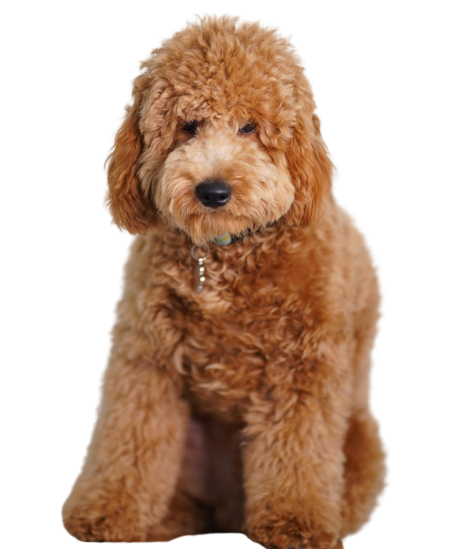Every mini goldendoodle owner cherishes the joyous moments shared with their furry friend. From the playful days of puppyhood to the calm demeanor of senior years, each stage brings unique experiences. Understanding these life stages can help you provide the best care and companionship for your mini goldendoodle. This guide delves into what to expect as your beloved pet transitions from a lively puppy to a wise senior.
Key Takeaways:
- Mini Goldendoodles go through distinct life stages, each with its own set of characteristics and needs.
- Early puppyhood is a time of rapid growth, exploration, and foundational training.
- Adolescence introduces new behaviors, energy levels, and training challenges.
- Adulthood brings stability in behavior, but also the onset of some health issues.
- Senior years require special care, understanding, and preparations for end-of-life decisions.
Puppyhood (8 weeks – 1 year)
Mini Goldendoodles in their puppyhood stage is a delightful mix of energy, curiosity, and rapid growth. This period, stretching from 8 weeks to about a year is foundational for their development.
Rapid Growth Phase
During these initial months, your mini goldendoodle will experience a significant growth spurt. For instance, they might double or even triple their weight in just a few short months. It’s essential to provide them with a balanced diet, rich in nutrients, to support this rapid development. Brands like “Puppy Chow” or “Blue Buffalo” offer specialized puppy formulas that cater to their unique dietary needs. Regular weigh-ins, perhaps monthly, can help monitor their growth and ensure they’re on the right track.
Housetraining and Socialization Priorities
Puppyhood is the prime time for housetraining and socialization. Introducing your puppy to various environments, like parks, pet stores, or even car rides, can shape their behavior in the future. Positive reinforcement techniques, such as treats or praises, work best during this stage. For example, rewarding your puppy with a treat every time they do their business outside can speed up the housetraining process.
Chewing and Nipping Behaviors
Teething can make puppies resort to chewing on almost anything they find. It’s not uncommon to find favorite shoes or furniture corners becoming their chew targets. Providing chew toys, like Kong toys or Nylabones, can help alleviate their discomfort and protect your belongings. Nipping, often a playful gesture, is another common behavior in puppies. Using toys to redirect their biting or giving them a firm “No” can help curb this habit.
Need for Frequent Vet Checkups and Vaccinations
Regular vet visits are crucial during this stage. Puppies require a series of vaccinations to protect them from various diseases like Parvovirus, Distemper, and Rabies. A typical schedule might involve visits at 8, 12, and 16 weeks for different shots. Discussing a vaccination schedule with your veterinarian ensures your mini goldendoodle stays healthy and protected.
High Energy and Exercise Requirements
With boundless energy, puppies need ample playtime and exercise. Regular walks, play sessions, and interactive toys can help channel their energy positively. For instance, a game of fetch in the backyard or a puzzle toy filled with treats can keep them engaged and reduce the chances of destructive behaviors.
Puppyhood Milestones for Mini Goldendoodles
| Age Range | Developmental Milestone | Care Recommendations |
| 8-12 weeks | Socialization window opens | Begin basic training, introduce to various environments |
| 3-4 months | Teething begins | Provide chew toys, monitor for nipping |
| 4-6 months | Rapid growth phase | Ensure balanced diet, regular vet checkups |
| 6-9 months | Adolescence onset | Reinforce training, monitor behavior changes |
| 9-12 months | Transition to adult coat | Begin adult grooming routine, monitor formatting |

Adolescence (1 – 3 years)
The adolescence phase in mini Goldendoodles, spanning from 1 to 3 years, is a pivotal period. Owners often liken it to navigating the teenage years in humans, filled with growth, learning, and a fair share of challenges.
Personality Development
During adolescence, a mini golden doodle’s personality starts to shine through. This is the time when they might showcase a penchant for certain toys, develop a favorite resting spot, or even exhibit specific reactions to household events. For instance, some might become alert watchdogs, barking when the doorbell rings, while others might hide, showcasing a more timid nature. Engaging in activities that cater to their emerging personality, like puzzle toys for the thinkers or fetch games for the active ones, can be beneficial.
Continued Training Focus
Training shouldn’t halt after puppyhood. The adolescence phase is crucial for reinforcing commands and introducing new ones. Regular training sessions, even if they’re short 10-minute drills, can solidify their learning. Consider introducing commands like “stay” or “leave it”, which can be lifesavers in potential danger situations. For those looking to challenge their pets, agility courses or advanced obedience classes can be a great avenue. They not only stimulate the dog mentally but also strengthen the bond between the pet and the owner.
Sexual Maturity and Mounting Behaviors
Reaching sexual maturity can introduce a slew of behaviors. Owners might notice increased mounting, territorial marking, or even some aggressive tendencies, especially in males. It’s essential to understand that these are natural behaviors, but they can be managed. Spaying or neutering is often recommended to curb unwanted behaviors and prevent unplanned litter. Discussing the procedure and its timing with a veterinarian is crucial.
Weight Gain Prevention with Diet and Exercise
As mini Goldendoodles transition from puppyhood to adolescence, their dietary needs change. Switching to adult food can help maintain a balanced weight. However, it’s not just about diet. Regular exercise is paramount. A study showed that dogs, much like humans, benefit immensely from regular physical activity, both mentally and physically. Structured activities, like a daily walk or play sessions with toys, can keep them in optimal shape. For those with a yard, setting up a mini agility course can be both fun and stimulating for the dog.
Adulthood (3 – 8 years)
The adulthood phase of a mini golden-doodle’s life is a time of stability and maturity. Owners often find this stage to be the most rewarding as the dog’s personality shines, and the bond between pet and owner deepens. However, it’s also a pivotal time for health maintenance, behavioral refinement, and ensuring a quality life for your pet.
Finish Growth and Fill Out the Physically
By the time a mini goldendoodle reaches adulthood, they’ve achieved their full height. However, their body continues to fill out, gaining muscle definition and a more mature appearance. Their coat might undergo subtle changes. For instance, a dog that had a wavy puppy coat might develop more pronounced curls.
Diet plays a crucial role during this phase. For instance, while a puppy’s diet is rich in fats and proteins to support growth, an adult dog’s diet should be balanced to maintain a healthy weight. Overfeeding or feeding calorie-dense food can lead to obesity, a common issue in many adult dogs. According to the Association for Pet Obesity Prevention, over 55% of dogs are classified as overweight or obese. Monitoring their weight and adjusting their diet, possibly with vet-recommended brands like Hill’s Science Diet or Royal Canin, can prevent weight-related health issues.
Teeth and Gum Problems Can Emerge
Oral health is paramount in adulthood. Neglecting dental care can lead to a myriad of problems, from bad breath to severe infections. Dr. Jane Smith, a renowned veterinarian, states that “Oral diseases can have a systemic impact, affecting the heart, liver, and kidneys.” Regular at-home dental care, combined with professional cleanings, can prevent most dental issues.
Toys designed for dental health can also be beneficial. For instance, Kong’s dental toys not only entertain but also clean the teeth as the dog plays. Another preventive measure is offering dental treats that are designed to reduce tartar build-up, like Greenies or Dentastix.
Increased Strength and Stamina
An adult mini goldendoodle is at its physical prime. Their stamina and strength are unparalleled compared to their puppy or senior stages. This is the ideal time to engage them in activities that challenge them physically. For example, Flyball is a relay race sport for dogs that tests their agility and speed. It can be an excellent activity for an energetic mini goldendoodle.
However, it’s essential to remember that while they have increased stamina, over-exertion can be harmful. Always ensure they have access to fresh water during activities and monitor for signs of exhaustion.
Steady Personality and Activity Preferences
One of the joys of reaching the adult stage is the predictability of behavior. Your mini goldendoodle will have developed distinct preferences by now. Perhaps they have a favorite toy, or they prefer a specific spot on the couch. Recognizing and catering to these preferences can deepen your bond.
For instance, if your mini goldendoodle shows a keen interest in sniffing during walks, they might benefit from scent work or tracking activities. On the other hand, a dog that loves to chase might enjoy “lure coursing” – a sport where dogs chase a mechanically operated lure.
Senior Years (8 years+)
The senior stage is a poignant phase in a mini golden-doodle’s life. It’s a time of slowing down, cherishing the moments, and ensuring the utmost comfort for your aging companion. As they transition into their golden years, understanding their evolving needs is crucial for their well-being.

Potential Decrease in Energy Levels
As mini Goldendoodles age, it’s natural for them to exhibit a decline in energy. The playful pup that once couldn’t wait to fetch might now prefer a leisurely stroll in the park. While it’s essential to respect their pace, it’s equally important to ensure they remain active to maintain muscle tone and joint health.
For instance, instead of long hikes, consider shorter, frequent walks. Swimming is another excellent low-impact exercise for senior dogs. It’s gentle on their joints and provides a full-body workout. Many cities now offer dog-specific swimming pools, like Pooch Paddle in Portland, which even provides senior dog swim sessions.
Sensory Decline like Vision/Hearing Loss
Sensory decline is a common aspect of aging. Your mini goldendoodle might not respond to calls as it used to, or it might be startled more easily. This could be indicative of hearing or vision deterioration.
Regular check-ups with the veterinarian can help monitor these changes. There are also training adaptations you can make. For instance, if your dog is losing their hearing, consider using hand signals for commands. If vision is declining, ensure their environment remains consistent to prevent confusion or accidents. Toys like Planet Dog’s Orbee-Tuff with LED lights can be beneficial for dogs with compromised vision.
Higher Incidence of Arthritic Joints, Dental Issues
Arthritis is a common ailment in senior dogs. Signs include limping, difficulty in rising, or a decrease in activity levels. While arthritis can’t be cured, it can be managed. Supplements like glucosamine and chondroitin are often recommended for joint health. Orthopedic beds, like those from Big Barker, can provide relief to aching joints.
Dental issues can also become pronounced in senior mini goldendoodles. Regular dental check-ups, combined with at-home care, can prevent severe dental diseases. Dental chews like Whimzees can aid in tartar control and are a favorite among many senior dogs.
Cognitive Changes like Disorientation
Cognitive Dysfunction Syndrome (CDS) is akin to dementia in humans. Signs include disorientation, disrupted sleep patterns, and changes in interactions. Early detection and intervention, with the help of products like Neutricks or diets like Hill’s Prescription Diet b/d, can slow the progression and improve the quality of life.
Importance of Routine Vet Care and Wellness Monitoring
Routine vet visits become even more crucial during the senior years. Regular blood work, urine tests, and thorough physical exams can detect issues early on. Dr. Emily Adams, a renowned veterinarian, states, “Early detection in senior dogs can mean the difference between management and crisis.”
End of Life
The end-of-life stage is undeniably the most challenging phase for any pet owner. It’s a time of reflection, decisions, and ensuring that your beloved mini goldendoodle transitions with dignity and comfort. Being informed and prepared can make this difficult time a little more manageable.
Recognizing Changes in Quality of Life
As your mini goldendoodle reaches the end of its journey, there will be noticeable changes in its quality of life. They might become less responsive, show decreased interest in activities they once loved, or face difficulty in performing basic tasks.
Veterinarians often use the HHHHHMM Scale, developed by Dr. Alice Villalobos, to assess a pet’s quality of life. This scale evaluates Hurt, Hunger, Hydration, Hygiene, Happiness, Mobility, and More Good Days Than Bad. Regularly assessing your dog using this scale can provide insights into their overall well-being.
Making the Decision for Euthanasia
One of the hardest decisions a pet owner will ever make is determining when it’s time to say goodbye. It’s a deeply personal decision, often guided by the dog’s quality of life, veterinarian advice, and the family’s circumstances.
Dr. Sarah Boston, a veterinary surgical oncologist, suggests, “It’s better a week too early than a day too late.” While it’s a heartbreaking decision, it’s also a final act of love, ensuring your pet doesn’t suffer unnecessarily.
Caring for Senior Dogs
Even in their twilight years, mini Goldendoodles require love, attention, and care. Simple adjustments, like providing a comfortable resting place, offering a balanced diet, and regular vet check-ups, can make a significant difference.
For instance, brands like Ollie and The Farmer’s Dog offer specially formulated meals for senior dogs, ensuring they get the right nutrients. Additionally, products like DogLift can assist in mobility, helping your aging dog navigate stairs or get into vehicles.
Grieving Process
Losing a pet is akin to losing a family member. It’s natural to feel a profound sense of loss and grief. Everyone processes grief differently. Some find solace in joining pet loss support groups, while others might choose to memorialize their pet through art or keepsakes.
Organizations like The Rainbow Bridge offer online forums where grieving pet owners can share their stories and find support. Remember, it’s essential to give yourself time to heal and remember the cherished moments you shared with your mini goldendoodle.
Final Thoughts
Life with a mini goldendoodle is a journey filled with joyous barks, wagging tails, and countless memories. From the playful antics of puppyhood to the serene moments of their senior years, every stage is unique and teaches us something new about our furry companions.
As they age, their needs and behaviors might change, but their unwavering love remains constant. By understanding the various life stages of your mini goldendoodle, you’re not just becoming a more informed pet owner; you’re ensuring that your furry friend gets the best care and love they deserve throughout their life.
Remember, it’s not about how long they are with us, but how much love and joy they bring into our lives. Cherish every moment, every bark, and every cuddle. Because in the end, it’s these memories that stay with us, long after they’ve crossed the rainbow bridge.

